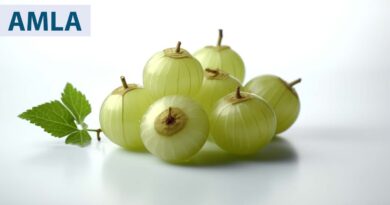Ginger: A Versatile and Health-Boosting Root
Table of Contents
Introduction
Ginger, known scientifically as Zingiber officinale, is a flowering plant that has been utilized for centuries in various cultures for both culinary and medicinal purposes. This versatile root, with its unique flavor and numerous health benefits, has earned a well-deserved place in the spotlight. In this article, we’ll delve into the fascinating world of ginger, exploring its history, culinary applications, health advantages, and much more.
A Brief History of Ginger
Ginger’s story begins in Southeast Asia, where it is believed to have originated. From there, it spread to India, the Middle East, and eventually reached Europe during the spice trade. Ancient civilizations recognized the medicinal properties of ginger, using it to treat various ailments. Today, it continues to be an essential ingredient in the culinary traditions of many cultures worldwide.
The Unique Flavor Profile of Ginger
Describing the taste of ginger is a delightful challenge. Its flavor is warm, pungent, and slightly sweet, with a subtle citrusy note. The presence of natural compounds like gingerol and zingerone gives ginger its distinctive kick. This characteristic taste makes it a key component in numerous culinary delights, both sweet and savory.
Culinary Applications of Ginger
Ginger’s versatility in the kitchen is unmatched. It can be used fresh, dried, powdered, or even as an oil or juice. It’s a staple in Asian cuisines, where it adds depth to curries, stir-fries, and marinades. Ginger can also be incorporated into baking, lending its unique taste to cookies, cakes, and bread. Moreover, it serves as a zesty addition to beverages, including teas and cocktails.
Health Benefits of Ginger
Beyond its delightful taste, ginger boasts an array of health benefits. The medicinal properties of gingerol, the bioactive compound in ginger, make it a powerful natural remedy. Some of the health advantages associated with ginger consumption include:
1. Digestive Aid
Ginger has long been celebrated for its ability to ease digestive discomforts, such as indigestion, bloating, and nausea. It aids in stimulating saliva, bile, and gastric enzymes, promoting smoother digestion.
2. Anti-Inflammatory Properties
Inflammation is at the root of many chronic diseases. Ginger’s potent anti-inflammatory properties can help reduce inflammation, potentially alleviating symptoms of conditions like osteoarthritis and rheumatoid arthritis.
3. Immune System Support
The rich antioxidant content of ginger contributes to strengthening the immune system. Regular consumption can help ward off infections and protect the body from harmful free radicals.
4. Motion Sickness Relief
For individuals prone to motion sickness, ginger can provide much-needed relief. Its anti-nausea properties can help alleviate queasiness during travel.
5. Cardiovascular Health
Studies suggest that ginger may have positive effects on heart health by lowering blood pressure and cholesterol levels, reducing the risk of heart disease.

Using Ginger in Natural Remedies
Ginger’s medicinal properties extend beyond its use in culinary dishes. It has been a vital component in various traditional and alternative medicine practices for centuries. Here are some natural remedies where ginger plays a significant role:
1. Ginger Tea
Ginger tea is a soothing and comforting beverage, often used to relieve cold and flu symptoms. Its warm and spicy taste helps ease congestion and provides relief from sore throats.
2. Ginger Compress
A ginger compress can be beneficial for localized pain relief, such as muscle soreness and menstrual cramps. The anti-inflammatory properties of ginger aid in reducing discomfort.
3. Ginger Poultice
A ginger poultice is an age-old remedy for joint pain and swelling. Applying a poultice to the affected area can provide relief and support healing.
Precautions and Considerations
Though ginger is generally safe for consumption, there are some considerations to keep in mind:
1. Allergic Reactions
Some individuals may be sensitive to ginger and experience allergic reactions. If you notice any adverse effects, discontinue use and consult a healthcare professional.
2. Medication Interactions
Ginger may interact with certain medications, including blood thinners and diabetes medications. It’s crucial to speak with your doctor if you’re taking any prescription drugs.
FAQ
Q1. Is ginger safe to consume during pregnancy?
Yes, in moderation. However, it’s essential to consult a healthcare professional before adding ginger to your diet during pregnancy.
Q2. Can ginger help with weight loss?
Some studies suggest that ginger may aid in weight management by boosting metabolism and reducing appetite. However, it’s not a substitute for a balanced diet and exercise.
Q3. How can I store fresh ginger?
To prolong its shelf life, store fresh ginger in the refrigerator in a sealed plastic bag or airtight container.
Q4. Can ginger be used in skincare?
Yes, ginger’s anti-inflammatory and antioxidant properties make it a valuable ingredient in skincare products, helping to improve skin health.
Q5. Are there any side effects of consuming too much ginger?
While ginger is generally safe, excessive consumption may lead to digestive discomfort or heartburn in some individuals. Moderation is key.
Conclusion
Ginger’s journey from ancient times to modern-day kitchens is a testament to its remarkable qualities. Its unique flavor, versatile culinary applications, and exceptional health benefits make it a root worth celebrating. Whether you’re adding it to your favorite dishes or exploring its role in natural remedies, ginger is a powerhouse of wellness.





